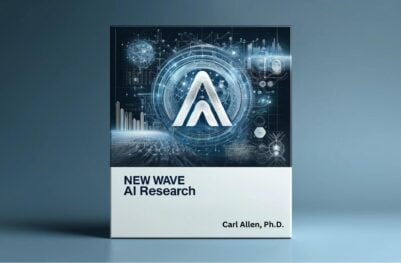- Developers
- Developer Blog
- AI Software Development
- The Pros and Cons of AI

profile

By Sam Palmer
Verified Expert
1 year of experience
Sam is a professional writer with a focus on software and project management. He has been writing on software-related topics and building PHP based websites for the past 12 years.
The Pros of Artificial Intelligence
Artificial intelligence has a lot of benefits. That‘s why it‘s being so frantically researched by the big companies. The ones we’ll be discussing today are:
- Safety
- Better performance than humans
- It’s cheap
- It can predict what your customers will do next
- It can make sense of all the data and connection around us
Let‘s dive in…
1. Safety
Let‘s face it, humans aren‘t perfect. Even the best of us make mistakes, often big ones, even at the best of times. We‘re emotional, biased, easily manipulated, and become bored quickly.
Machines don‘t have any of these problems. A computer can stay on the same task for years without ever breaking concentration or making a single mistake. It also won‘t get emotional in stressful situations or have compromising biases that cloud its judgment.
A classic example is with driving. We‘re terrible at it. Over 3000 people die every day from road crashes worldwide, and most of those deaths are due to human error and are completely avoidable. It‘s no surprise then that self-driving cars are one of the main industries pushing AI research. Google, Uber, and Tesla are building mechanical minds that promise to steer cars through traffic faster and more efficiently than ever, without a single crash in a year. That‘s a level of safety that humans can never achieve.
2. Better performance than humans
Many tasks are just too complicated for humans to do perfectly. Even without boredom or emotional distractions, sometimes there are just too many factors for our mushy brains to take into account.
This is the case with healthcare. While doctors do an amazing job, in the US one in 5 diagnoses are flawed and 1.5 million medication mistakes are made every year. This is no surprise, as it would take 160 hours per week to keep up with all new medical papers, but 81 percent of physicians spend 5 hours or less per month reading them. Something has to help bridge that gap.
IBM‘s Watson is quickly becoming one of the best doctors in the world. It can analyze and remember every detail of every medical paper ever written, and keep up with new ones in real-time. It can then use this vast depth of knowledge to recommend treatments as well as the best doctors, and often finds things the doctors miss.
AIs have the capacity to perform better than the world’s best experts at many tasks already and are making the world healthier. This is a good thing for everyone.
3. It‘s Cheap
Let‘s be honest, cost-saving is usually the main reason a new technology gets adopted. If it trims down your bottom line, it‘s probably on your company wishlist.
AI has huge potential to save businesses money. A big one is by reducing manual labor, as it’s usually one of the biggest expenses at any organization. If some of that cost can be reduced by automation, it‘s going to happen (don‘t worry, we are also going to talk about the consequences of this later). It‘s tempting to imagine a robot actually sitting at a desk and taking the entire job of a human, but it‘s not quite as simple as that.

Get a complimentary discovery call and a free ballpark estimate for your project
Trusted by 100x of startups and companies like
The way this really happens is by automating parts of people‘s jobs. A great example is with legal work. Ailira is an AI legal assistant that‘s helping tax law firms cut costs and improve performance. Work that would take a team of paralegals days to complete can now be done in a few seconds. It‘s so good in fact, that one girl used it to pass a University tax law exam without any legal knowledge whatsoever.
AI Chatbots are also popping up all over the internet. If you don‘t know already, many of those customer service agents you‘ve been chatting to are actually bots. They are getting so good it can be hard to tell. These can be used by your team in a similar way. The bots can deal with easy, routine queries that don‘t need a human assistant, then pass on the more complex problems to the customer service team.
With both of these the benefits are obvious:
- Less staff are now needed for the same amount of work
- Current staff have more time free for other tasks
Those are both important to any business trying to stay competitive.
4. It Can Predict What Your Customers Will Do Next
Being able to predict customer behavior is a massive advantage for any business. We might like to think we‘re all unique and special, but that‘s not what the statistics say. Already AIs can predict song preferences, what you‘re likely to buy next, and apparently even guess your sexuality with astonishing accuracy.
Amazon has used machine learning to predict customer behavior and build the biggest retail empire in the world. If you‘re not already using AI predictions in your industry, maybe it‘s time you did.
5. Artificial intelligence can make sense of all the data and connection around us
The business world is now far too complex and interconnected for even experts to fully understand. The scope and depth of connection between different markets, currencies, countries, politics, etc is just insane. A single, seemingly isolated event can have instant, worldwide ramifications. Artificial Intelligence is now giving us tools to make sense of all of this connection and information.
The forex and stock markets are already dominated by AIs. These machines take in millions of data points in real-time and use them to find patterns and make profitable trades. You might not be a stockbroker or day trader, but a similar principle could apply in your industry.
AIs can take in historical and real-time data to find trends and insights that would otherwise get lost in a sea of 1s and 0s. This can help businesses make good decisions and prevent mistakes.
The Cons of Artificial Intelligence
As with every new technological advancement, there are a few downsides to machine learning technology too. Some are technical difficulties for engineers, some are moral dilemmas, and some are threats to our very existence. The ones we‘re going to look at are:
- Things can go wrong
- AI can be vulnerable to attack
- Economic problems
- Trust issues
- They aren’t geniuses
- Abilities of people will diminish
- Moral and ethical implications
- Weaponization could be disastrous
1. Things can go wrong
Computer programs will do exactly what you tell them to do. The problems usually come in when the programmers don’t quite get it right. Bugs in traditional software are down to human errors in coding rather than problems with the actual computer. Problems with AI software programs can be a little more complex, subtle, and sometimes terrifying.
There have been some comical problems with artificial intelligence being poorly applied, like this AI bot‘s hilarious attempt at creating inspirational posters…
The kinds of problems I‘m talking about are a little more subtle. These happen when AIs goals become misaligned with what we really want from it.
AI algorithms have a performance measure to guide them in whatever task they are doing – a kind of goal you set for it to complete. The AI learns from past and current data, and then it makes the choices it thinks will bring it closer to its goal. Pretty simple.
Now imagine a powerful AI with access to all the world‘s markets. You might give it a goal of “maximise the value of my portfolio”. This sounds reasonable at first, I mean, what could go wrong with that? Well, as Elon Musk says, A LOT. “A clever AI might decide that the best way to do that is to short consumer stocks, go long defense stocks, and start a war.” In AI speak, this corrupting of a seemingly benign goal is called perverse instantiation.
That really is terrifying.
Other things can go wrong too. Here‘s a list of ways AI has already gone wrong in the real world:
- One of Tesla‘s self-driving car crashed
- Wikipedia‘s article clean up bots can have feuds over spelling and grammar that have lasted for years
- Uber has been repeatedly criticized when their AI surge pricing algorithm has charged high premiums during terror attacks
- Microsoft‘s AI twitter chatbot that learns from users went on a racist, genocidal rampage
And more disasters are inevitable. No AI, no matter how powerful, can be prepared for every situation possible. Things are going to go wrong, we just have to be prepared when they do.
Hire expert developers for your next project
1,200 top developers
us since 2016
2. AI can be vulnerable to attack
AIs are software programs that are vulnerable to attack just like all software. The only difference is that when ’intelligence‘ is involved, things can get weird…
We already talked about Microsoft‘s chatbot going wrong. Well, this is an example of an attack on an AI system. Tay, the Microsoft chatbot, learns from users’ input to become smarter. A group of users took advantage of this and launched a coordinated attack to teach Tay some seriously messed up stuff. The result was some very uncomfortable tweets and a PR disaster for Microsoft and the whole field of AI.
Another type of attack is to purposely give an AI an input you know it will misunderstand. One group have designed glasses that can trick facial recognition AIs into thinking you are someone completely different. Check out who these people got mistaken for…
Needless to say, hackers and cybercriminals are going to come up with some creative ways to fool AI systems. AI is even going to be used in cyber attacks. Add this to the problem of AI products going wrong all by themselves, and you can see how we have some worrying problems to come.
3. Economic problems
Technological advancements always deliver shocks to economies as new businesses emerge and the old way of doing things crumbles. Jobs are lost and empires are shattered, its all part of an initially painful but eventually beneficial process. The difference now is the speed and scale of this process.
Intelligent automation is already crashing towards our economy, and it‘s not slowing down. And if you think you‘re safe in America or for another few decades, think again. A new Oxford study found that nearly half of all US jobs are at risk of automation over the next 20 years. It seems unlikely that our economy, markets, and skills are going to adapt quickly enough to accommodate such a tectonic shift. How are you going to cope if you lose your job at the same time as millions of people? How would you cope with firing 50% of your workforce in just a few years?
Another effect of this is never before seen concentrations of power. Tech giants like Google, Amazon, and Facebook have such large monopolies on data and intelligence, it‘s almost impossible for anyone else to get in on the action. In an economy where inequality is already rampant, it paints a pretty grim picture for the future.
There have been some ideas to help ease some of these problems. Mark Zuckerberg has suggested a universal basic income to help deal with forced unemployment.
4. Trust issues
There‘s something inherently unnerving about machines that can think and act intelligently. Especially when they have access to much of our personal information. It also doesn‘t help that there have been so many blockbuster films over the years about AIs trying to undermine the human race.
This poses a problem for any business introducing artificial intelligence into their products and services. Customers need to be convinced that the benefits of artificial intelligence outweigh the risks and the invasion of their privacy.
However, this hasn‘t been as much of a problem as many people suspected it would be a few years ago. If anything is scary, it‘s been how easily the general population has given up their privacy and personal data in exchange for convenience. A few decades ago, someone had asked you if you would want to have all of your movements tracked, so you can better navigate around traffic, you would have probably said no. Now, everyone that uses Google Maps has agreed to exactly that.
5. They aren’t good at everything
It‘s easy to overestimate the abilities of an AI. When a computer solves one complex problem instantly and flawlessly, it really feels like it should be able to solve another. After all, smart people can usually apply their intelligence to many different problems. But, most AI algorithms and bots available now have an extremely limited scope.
As organizations hand over more of the decision making power to automated machines, they need to stay acutely aware of their limitations.
6. Abilities of people will diminish
Technology has been taking care of tasks humans don‘t want to do for millennia. Usually, it‘s great when we no longer have to do so remedial task ever again. The problem now is that the tasks being automated are to do with actual thought and cognition. I.e. some of the things that make us human.
The generations growing up over the next few years and decades are going to have large sections of their lives done for them. Things like driving, remembering appointments and birthdays, navigating, sending emails, researching, math, writing, selecting an outfit, choosing what to buy, and even computer programming are all going to be largely done automatically.
So what abilities are we going to lose forever?
7. Moral and ethical implications
We talked earlier about how a lack of biases and emotions can be an advantage in many situations. Well, now we are about to see how there are two sides to that coin. A machine that lacks biases and emotional problems also lacks humanity and compassion. As long as an AI algorithm is achieving its goal, it doesn’t really care what damage or harm it does.
The problem then is how to program an AI with morals. At first glance, you might think something like the Three Laws of Robotics would be enough. It turns out though, that this isn‘t simple at all, and there are some really tricky questions about what counts as ethical. How would you answer some of these questions:
- Should a self-driving car swerve into another person to save the driver?
- Should a trading bot that predicts a disaster tell everyone, or is it allowed to keep it a secret and earn money off of the prediction
- Is it OK for a smart eCommerce store to recommend a product to someone in a moment of weakness?
- Should we program military robots to kill terrorists?
These questions open up hugely complex debates that I‘m not going to get into here. But remember, if you‘re thinking about adopting or developing AI at your organization, you might need to answer some difficult questions like these.
Hire expert developers for your next project
8. Weaponization could be disastrous
The last con on this list is so bad it could drag the world into war. Autonomous weapons that can locate, identify, and engage targets without human intervention will be possible within a few years, not decades. Most of the technology exists already. This has been described as the third revolution in warfare. The first two were gunpowder and nuclear weapons.
An autonomous weapon might take the form of a quadcopter or a drone, with a weapon mounted on it. You can already buy quadcopters in the US for just a few hundred dollars. Many of them can even drive and navigate themselves now too, and they are going to keep getting cheaper, faster, better, and smarter. With weapons being so readily available too, it‘s not difficult to make the leap to automatic killing machines.
In a world where these exist, an arms race seems almost inevitable. Autonomous weapons will become cheap and devastatingly powerful in no time. The barrier to war or conducting large-scale attacks would fall to dangerous levels. Even relatively small groups would have the ability to cause serious damage.
AI – A double-edged sword
Paul Virilio said that when you invent the plane, you also invent the plane crash. With AI still very much in its infancy, we are just finding out what AI “plane crashes” look like. There are many ethical, financial, technical, economic, and military dangers to such a powerful technology.
The positive side is also enormous. The possibility of a safer, healthier, richer world is too good to pass up on. Right now AI and machine learning can be used to improve your personal life and turn you a profit. Let‘s just make sure we tread a little carefully.
If you want to know how to implement AI in your enterprise, check out our article here.
Frequently Asked Questions
What are the pros and cons of artificial intelligence?
The advantages of AI are as follows:
- AI algorithms reduce human errors.
- AI-powered systems work 24×7, which allows smart utilization of experienced human resources. This helps with many functions like customer support, cybersecurity, etc.
- AI-powered digital assistants help with common day-to-day tasks.
- Systems using AI make decisions based on data and evidences.
- AI offers intelligent automation, which goes well beyond rules-based automation. This makes AI very important in several sectors like agriculture, manufacturing, healthcare, etc.
AI has a few disadvantages too, which are as follows:
- Developing AI systems requires niche skills, and it’s hard to find enough skilled developers.
- Complex AI systems are expensive to implement.
- AI technologies that are currently available commercially have limitations, and they can only accomplish relatively simpler tasks.
- Much of AI research and development is open-source, therefore, malicious actors can easily access them. They can use AI to harm people and organizations.
Where has artificial intelligence helped society?
There are many examples where AI has helped society. An example is the growing use of AI-powered tools for cybersecurity. Cyber-attacks are increasingly sophisticate and data breaches put sensitive personal information of many people at risk. AI is helping organizations in fighting cybercriminals by analyzing massive volumes of data to detect potential suspicious behavior online.
Where has artificial intelligence caused harm to the society?
Unfortunately, authoritarian states are using AI to conduct intrusive surveillance. AI capabilities like facial recognition have become useful tools in the hands of these states to suppress and marginalize minorities.

Alexey Semeney
Founder of DevTeam.Space
Hire Alexey and His Team To Build a Great Product
Alexey is the founder of DevTeam.Space. He is award nominee among TOP 26 mentors of FI's 'Global Startup Mentor Awards'.
Alexey is Expert Startup Review Panel member and advices the oldest angel investment group in Silicon Valley on products investment deals.


